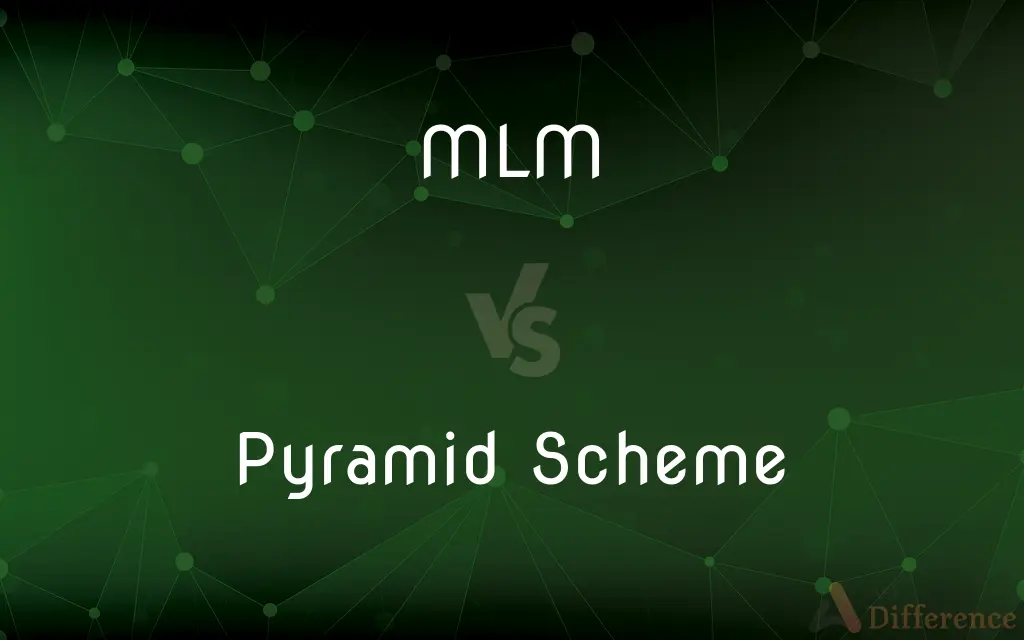MLM vs. Pyramid Scheme — What's the Difference?
By Tayyaba Rehman & Urooj Arif — Published on February 2, 2024
MLM (Multi-Level Marketing) involves selling products and earning commissions from sales and recruitment. Pyramid schemes focus on profits primarily from recruitment, often without a genuine product, making them illegal.

Difference Between MLM and Pyramid Scheme
Table of Contents
ADVERTISEMENT
Key Differences
Multi-Level Marketing (MLM) involves a hierarchical structure where salespeople earn commission from their sales and a percentage from the sales of those they recruit. Pyramid Schemes, however, primarily focus on generating income by recruiting new members rather than by selling actual products or services. While MLMs have a product or service at their core, pyramid schemes often lack a legitimate product or service.
MLM companies legally operate by selling products or services. Participants earn money both from direct sales and from the sales made by their recruits. In contrast, Pyramid Schemes rely on the recruitment of new members to generate revenue. Often, there's an emphasis on recruiting over selling, which can lead to unsustainable business models and potential legal issues.
MLMs are legal and often focus on legitimate sales. These companies provide actual goods or services, and their revenue primarily comes from selling these products. On the other hand, Pyramid Schemes are illegal and do not have a sustainable business model because they rely heavily on recruitment for income and often lack a solid product base.
In MLM, the potential for income growth is theoretically unlimited but practically limited by market saturation and the individual's sales skills. Pyramid Schemes, however, promise high returns in a short time, primarily through recruitment, which is often unrealistic and unsustainable as the number of new recruits eventually dries up.
MLMs require participants to focus on both selling products and recruiting new members to build their sales network. In contrast, Pyramid Schemes focus mainly on recruitment, and any product involved is typically incidental and lacks real value.
ADVERTISEMENT
Comparison Chart
Primary Focus
Selling products/services
Recruiting new members
Legality
Legal (in most countries)
Illegal
Revenue Source
Product sales and recruitment
Primarily from recruitment
Sustainability
Potentially sustainable
Unsustainable
Product/Service
Real, marketable products
Often no real product
Compare with Definitions
MLM
MLM is a direct selling strategy involving a network of salespeople who sell products and recruit others to do the same.
John joined an MLM company to sell health supplements and build his own team of salespeople.
Pyramid Scheme
A Pyramid Scheme is an illegal business model that makes money primarily through recruiting new members rather than sales.
The company was shut down for operating a Pyramid Scheme, as it focused more on recruitment than actual product sales.
MLM
MLM is a marketing strategy where individuals sell products directly to consumers and encourage others to join as salespeople.
Emma uses social media to promote her MLM skincare products and to recruit new team members.
Pyramid Scheme
In a Pyramid Scheme, each member pays to join and is compensated by recruiting new members, leading to an unsustainable structure.
The Pyramid Scheme collapsed when it became impossible to find new recruits to fund the promised returns.
MLM
MLM, or network marketing, is a business model where profits are derived from both personal sales and the sales made by recruited members.
Sarah earns a commission on her cosmetic sales and additional bonuses from her recruited team's sales in her MLM business.
Pyramid Scheme
Pyramid Schemes often disguise themselves as legitimate businesses but lack a real revenue-generating product or service.
Despite appearing as a genuine investment opportunity, the company was actually a Pyramid Scheme with no real financial basis.
MLM
MLM involves a tiered sales force where members gain income from their sales and a percentage from the sales of their recruits.
In his MLM venture, Mike sells kitchenware and also earns from the sales of the people he has recruited.
Pyramid Scheme
A Pyramid Scheme is a fraudulent system where the primary way to make money is through recruitment, not through selling goods or services.
Many people lost money in the Pyramid Scheme, as the focus was on recruitment fees rather than selling any actual products.
MLM
MLM operates on a multi-level structure where each salesperson's income depends on their sales and the sales of their network.
As part of her MLM strategy, Lisa focuses on selling fitness equipment and growing her network to increase her earnings.
Pyramid Scheme
Pyramid Schemes promise high financial returns for recruiting others into the scheme, often without a legitimate product or service.
The Pyramid Scheme enticed people with promises of quick riches for recruiting friends, but there was no real investment involved.
Common Curiosities
Can MLM be confused with Pyramid Schemes?
Yes, MLM can be confused with Pyramid Schemes as both involve recruitment, but MLM is legal and product-based, unlike Pyramid Schemes.
What is a Pyramid Scheme?
A Pyramid Scheme is an illegal business model focused on recruiting members, with income primarily based on recruitment, not sales.
What is MLM?
MLM, or multi-level marketing, is a business strategy where salespeople earn income from their sales and from the sales of recruits.
Why are Pyramid Schemes illegal?
Pyramid Schemes are illegal because they are unsustainable and often lack a legitimate product, relying on recruitment for revenue.
Is MLM legal?
Yes, MLM is legal in many countries, provided it focuses on selling products or services and not just on recruiting.
Are all MLM businesses ethical?
Not all MLM businesses are ethical; some may operate similarly to Pyramid Schemes, focusing on recruitment over product sales.
What risks are involved in joining an MLM?
Risks in MLM include market saturation, dependency on recruitment for income, and potential loss of investment.
How do Pyramid Schemes make money?
Pyramid Schemes make money primarily through recruiting new members and their initial investment.
What happens when a Pyramid Scheme collapses?
When a Pyramid Scheme collapses, most participants lose their money, as the scheme relies on an ever-increasing number of recruits.
Do MLM participants need to recruit to earn money?
In MLM, participants can earn money through direct sales, but higher earnings often come from building a network of recruits.
Can one make a sustainable income with MLM?
It's possible to make a sustainable income with MLM, but it depends on individual effort, sales skills, and market conditions.
What's the main focus of MLM?
The main focus of MLM is selling products or services and building a network of salespeople.
How can one identify a Pyramid Scheme?
A Pyramid Scheme can often be identified by promises of high returns from recruitment, a lack of a solid product, and a focus on recruitment fees.
What's the main warning sign of a Pyramid Scheme?
The main warning sign of a Pyramid Scheme is the emphasis on recruitment over actual product or service sales.
Are there successful MLM companies?
Yes, there are successful and legitimate MLM companies that focus on product sales and ethical business practices.
Share Your Discovery

Previous Comparison
Premise vs. Supposition
Next Comparison
Flea Market vs. Farmer’s MarketAuthor Spotlight
Written by
Tayyaba RehmanTayyaba Rehman is a distinguished writer, currently serving as a primary contributor to askdifference.com. As a researcher in semantics and etymology, Tayyaba's passion for the complexity of languages and their distinctions has found a perfect home on the platform. Tayyaba delves into the intricacies of language, distinguishing between commonly confused words and phrases, thereby providing clarity for readers worldwide.
Co-written by
Urooj ArifUrooj is a skilled content writer at Ask Difference, known for her exceptional ability to simplify complex topics into engaging and informative content. With a passion for research and a flair for clear, concise writing, she consistently delivers articles that resonate with our diverse audience.














































